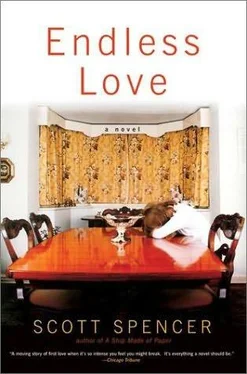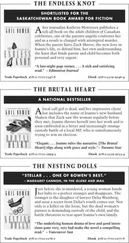“No. It’s all right.”
Jade watched me look at the ashes and when my gaze ticked away from them, she released the pressure from the sides of the envelope and withdrew it.
“Everything’s happening at once. Ending this long-term thing with my friend. You know, even seeing my family, I mean just on a nothing occasion, takes its toll. One at a time is hard. In a group—murder. Really. It takes so much out of me. I have to fight for everything. I feel so thick in the past. Everything’s exhausting. The family politics don’t stop for death, you know. If anything, they get more nasty and frantic, like a chicken running around with its head cut off. And now you. Of all times, right? When I can handle it least. Everything happens at the wrong time—especially between me and you.”
“I’m not rushing you. I know what I want, to be near you, but I know it’s not simple. I act like I don’t know anything except what I want, but I do know more than that.”
“I don’t feel pushed by you,” Jade said. “I don’t even know if you can reach me yet. You understand? And I’m exhausted. I can feel little parts of me going to sleep. I’m going to call Vermont Transit and they’re going to tell me there’s not another bus until about seven next morning. And then I’m going to have to go to sleep. We’re going to talk about one of us sleeping in this chair, or camping out on the floor. But that’s not going to happen. We’re both going to fall asleep in that double bed and it makes no sense for it to be happening like this. If we are going to reinstate our friendship, won’t this put another hex on it? I was wrong to stay. We should have arranged to meet some other time.”
“I will sleep on the floor,” I said. “I do that a lot anyhow.”
“Why?” Jade asked.
“Sometimes I can’t stand being in a bed.”
“I’ve got to sleep.” She closed the envelope and pushed her portion of Hugh’s ashes into her overnight bag with the impatience of filing a bill you have no intention of paying but don’t dare throw away. It was how she treated the mimeographed multiple-choice test papers she’d done poorly on: Jade’s talents as a student were ones of accumulation and exposition; she had no skill for filling in the blanks. An associative intelligence, deep, transforming, but not quite specific. She saved the examinations to study her mistakes, shoved them into a sideways folder at the bottom of her little yellow desk. A hoarder of debts, mapping out elaborate voyages of self-improvement. Evelyn Woods Speed Reading. The articles razored out of Scientific American. Twenty-five Ways to a Better Memory. Sprigs and leaves gathered on walks and stored in a cigar box for future identification. A collection of snapshots, ticket stubs, matchbooks, and menus shoved into a Woolworth’s bag with her diary, along with scraps of paper inscribed with key words—“Sammy’s stolen bicycle,” “examining breasts,” “rainwalk”—and all waiting for the ideal time to be inscribed in those empty oblong pages: her life as it happened, viewed from the outside. Her great task was to build an intellectual bridge from the universe of insight and feeling to the universe of quantifiable, reportable facts. To be a little more like Keith, able to rattle off her reasons one two three. She could have lived indefinitely in the fertile haze of her instincts and perceptions, but she wanted to learn the outward signals. She was tired of people not realizing exactly how rich and complex her mind was.
But now she was a senior at a good college. She must have learned any number of mental tricks, pared down her thoughts, organized them. Learned how to present herself. Learned how to pass.
She zippered up the bag and slung it over her shoulder. I had a moment’s panic that awakened a bit of cloddishness in me: I thought of throwing myself against the door. But she turned away from me, away from the door out, and faced the bathroom.
“I’ll change in there,” she said.
“OK,” I said. “That’s fine.” I tried to make my voice light but I don’t think I got very close.
She hefted the bag once or twice as if she could tell by the weight if everything was in place.
“You want to use the bathroom first?” she said.
“No. Go ahead.”
She shrugged, as if I’d refused to take her business advice. “OK,” she said, “but I’ll be a while.”
I was on the floor, so rigid that most of my spine did not touch the rug. In my underwear, covered by a thin, butterscotch- colored blanket (butterscotch-Butterfield: the meaningless association Ping-Ponged in my head) and a cushion from the armchair serving as my pillow. I left the two real pillows on the bed for Jade—her luxury. When I’d slept nightly with her we needed three pillows, the third for her to embrace in those private, essential hours of sleep when her back was to me and her life was as closed as an oyster. Sometimes she kept the pillow pressed to her small breasts, but most often it ended tucked between her thighs. That third pillow was often hard to keep hold of; the other kids appropriated it for their hard, monastic beds. A way of stealing our magic, subtly defacing us. Coal- dusted hands reaching through the iron grille and swiping irises from the rich man’s lawn. “I bought that pillow with my own money,” Jade had fairly whined, patrolling the house in her robe and not being as careful as she could have been to keep it belted. Even then I realized the teasing arrogance of much that she did, but I never minded: I’d helped to make it possible by whisking her into happiness. Changed her position in the family from one of ambiguous status to a wild card.
Jade got into bed and noticed both pillows were there. I saw her notice. There was always a physical response to information: a nod, a blink, a subtle realignment of posture. But then I thought that she’d made something different out of it. She guessed that I’d left the pillow there because I planned sooner or later to work myself into bed.
I’d folded down the blanket and smoothed the border of sheet so it would look like the bed was new. The lamp with its little tea-colored shade was on next to her bed. Its switch was made to look like an old-fashioned farmhouse key.
When she first came out of the bathroom she was wearing a light green robe, the color of her eyes. She’d walked right by me without pausing, swiftly, as if she needed to cover a great distance. I had my hands behind my head, flexing my biceps so they’d look reasonably large. I tried not to follow her obviously with my eyes. Her feet looked brutal: hiking boots, crosscountry skis, inexpensive tennis shoes all had squeezed, reddened, and allowed her feet to callus and spread.
I realized when she slipped into bed that I’d placed my head in such a way that even though I was camped like a dog at the foot of the bed I could still enjoy a perfect angle of her face. As long as she came to rest on the side of the bed the lamp was on—which she did.
She tucked the edge of the pillow into the space between the mattress and the headboard. That hadn’t changed. Then she turned off the light. The room didn’t go particularly dark; it was maybe 70 percent dark. It was lit by the lights of the city, the dome of diffusion that was above the city, and my own desire to see. Jade unbuttoned her robe and took it off. She wore pajamas underneath, pajamas cut in an Oriental style. They looked wet and shiny in the weak light. It was a modest gesture, finishing her undressing in the bed under cover of darkness, modest and unnecessary, and it gave evidence of a certain kind and intensity of awareness—awareness of me, that is.
She let the robe drop to the floor and I went dizzy with hope.
“Well, good night,” she said, after a few moments.
Читать дальше












